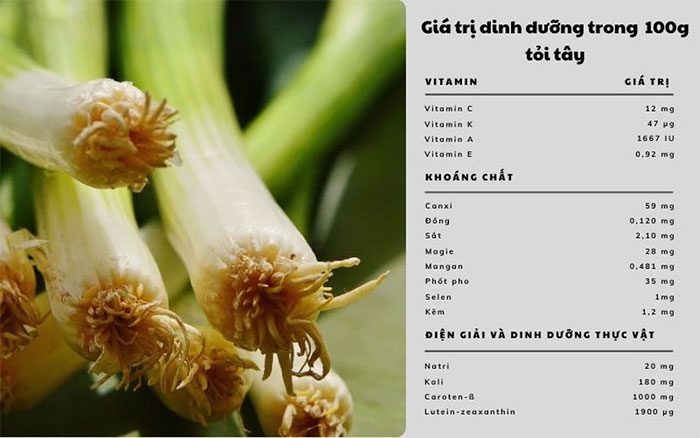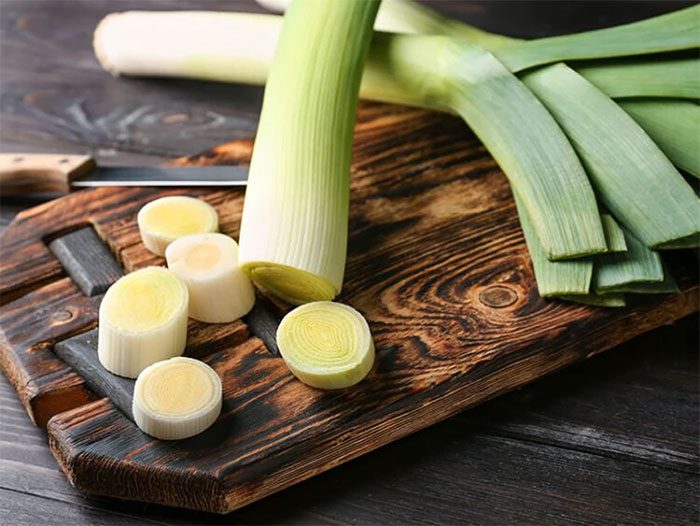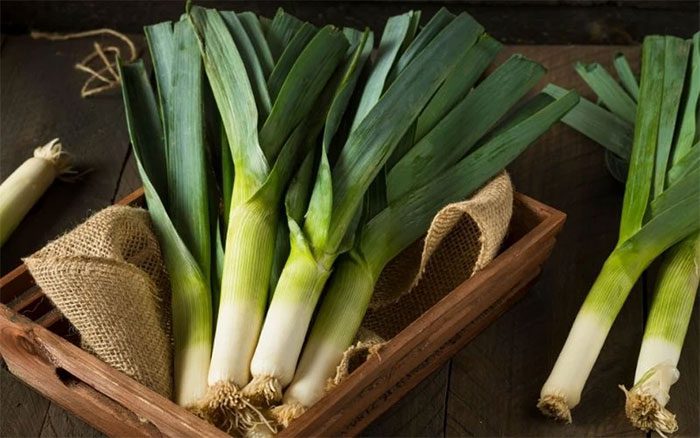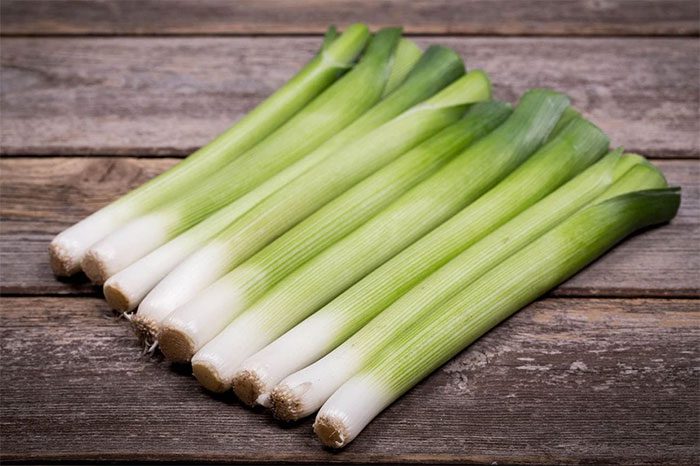Leeks, also known as Allium ampeloprasum, are closely related to onions, garlic, and chives. Leeks resemble giant green onions but have a milder, slightly sweet flavor. Due to their rich and diverse nutritional value, this culinary herb offers numerous health benefits.
Health Benefits of Leeks
1. Nutritional Value of Leeks
Leeks are rich in vitamins and minerals while being relatively low in calories. The nutrients found in leeks include:
- Vitamins A, K, C, and E
- Folate
- Iron
- Calcium
- Copper
- Magnesium
- Manganese
- Phosphorus
- Selenium
- Zinc
- Sodium
- Potassium
- Carotene-ß
- Lutein-zeaxanthin

Nutritional value of leeks. (Image: SKHN).
2. Health Benefits of Leeks
2.1. Reducing Inflammation and Supporting Heart Health
Leeks contain beneficial compounds that are believed to reduce inflammation and protect heart health. For instance, leeks contain kaempferol, a compound known for its anti-inflammatory properties. Additionally, foods high in kaempferol are associated with a reduced risk of heart attack or death from heart disease.
Moreover, leeks also have allicin and other thiosulfinate compounds, which are sulfur compounds that help lower cholesterol, reduce blood pressure, and decrease the risk of blood clots, thus benefiting cardiovascular health.
2.2. Fighting Certain Cancers
Kaempferol in leeks is known to reduce inflammation, which may help kill cancer cells and prevent their spread.
Leeks are also a rich source of allicin, a sulfur compound that is beneficial for heart health and is believed to have anti-cancer properties.
According to some studies, consuming allium vegetables, including leeks, may reduce the risk of stomach and colorectal cancers.

Kaempferol in leeks is known for its anti-inflammatory and cancer-fighting properties. (Image: Internet).
2.3. Good for Digestive Health
Leeks are beneficial for digestive health due to their soluble fiber content, including prebiotics. This type of fiber helps maintain a healthy gut, reduces inflammation, and aids in the absorption of essential nutrients.
2.4. Aiding Weight Loss
Like most vegetables, leeks can effectively support weight loss. With only 31 calories per 100 grams of cooked leeks, this herb does not contribute to weight gain. Furthermore, leeks provide good hydration and fiber, which can prevent hunger and keep you feeling full longer, thus helping reduce overall calorie intake.
Additionally, leeks contain soluble fiber that forms a gel in the intestines, which is particularly effective in reducing feelings of hunger and cravings.
2.5. Beneficial for Pregnant Women
Leeks are great for pregnant women as they are a good source of folate. Folate is essential during pregnancy to prevent miscarriage and neural tube defects, which are abnormalities that occur in the brain and spinal cord of the developing fetus.
Allium vegetables also reduce the risk of spontaneous preterm birth, especially during the 28 to 31 weeks of pregnancy. This is crucial since premature birth can increase many risks for the child, such as jaundice, anemia, and infections.

Folate in leeks can help prevent neural tube defects in the fetus. (Image: Internet).
2.6. Fighting Infections
Leeks contain a significant amount of vitamin A, which can support the development of healthy red and white blood cells that transport oxygen and combat infections.
Additionally, a vegetable related to leeks has been studied for its anti-flu properties. It is believed that this vegetable’s ability to fight the flu virus is due to the presence of fructans, particularly the same type of fructan found in leeks. Therefore, this suggests that leeks may also possess similar anti-flu properties.
In addition to these remarkable benefits, leeks offer various other advantages such as lowering blood sugar levels, improving brain function, protecting the eyes from oxidative damage, keeping bones healthy, and preventing anemia.
3. Considerations When Eating Leeks
Overall, leeks are safe for most individuals. However, those with kidney stones should limit their consumption of this vegetable. This is because leeks contain a significant amount of oxalates, which can form crystals in the urine.
While it is advisable to limit their intake, it does not mean you have to eliminate leeks completely from your diet. People can combine them with various foods to create a diverse diet. Moreover, cooking leeks can significantly reduce their oxalate content, making it less of a concern.

Those with kidney stones should not consume too many leeks. (Image: Internet).
4. How to Incorporate Leeks into Your Diet
Leeks can be prepared in various ways, such as boiling, frying, or eating raw, and can be added to several dishes, like stir-fried squid with leeks or steamed fish with leeks. However, steaming leeks retains the highest concentration of antioxidants and is healthier than boiling.
Here’s how to prepare leeks:
- Trim off the roots and the dark green tops, keeping only the white and light green parts.
- Slice the leeks lengthwise and wash them under running water, scrubbing away any dirt and sand that may be trapped between their layers.
Although you can find leeks year-round, the freshest and safest leeks are available in winter and early spring, as this is their peak season. Eating seasonal foods is not only nutritious but also helps avoid exposure to chemical pesticides.
When selecting leeks, look for stalks that are uniform in size, long, firm, and white with healthy roots (no larger than 1.5 inches in diameter), and avoid any that are yellowing.



















































